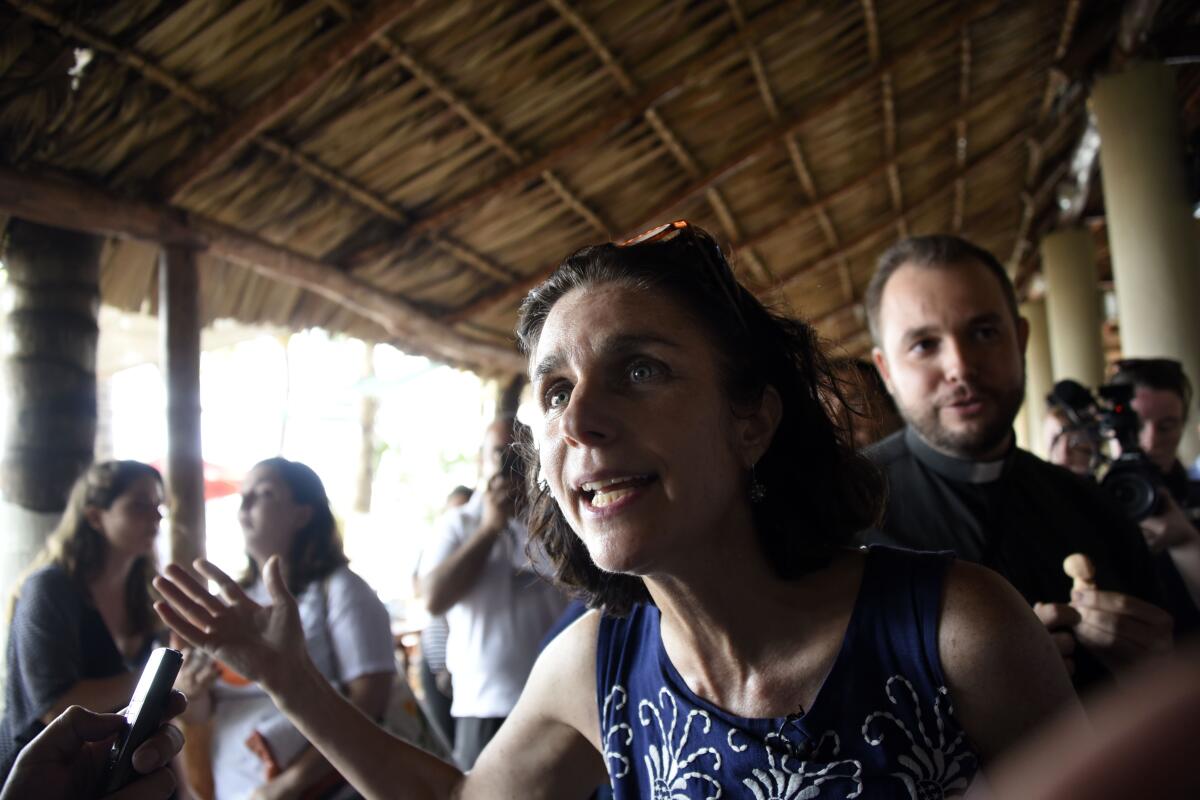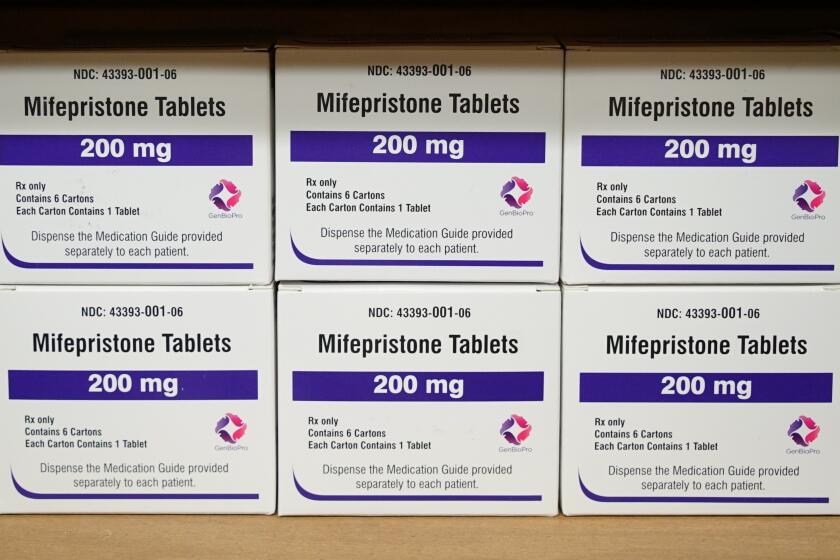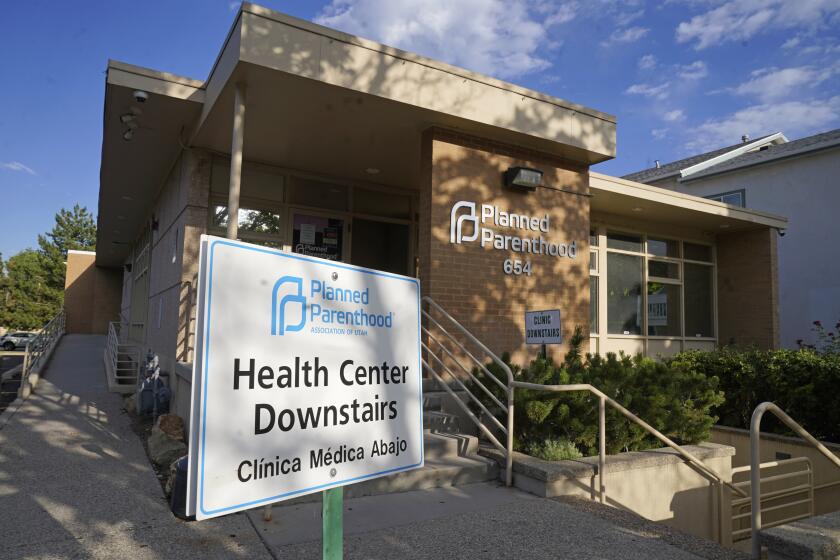This doctor says bans won’t stop her from getting abortion pills to women in the U.S.

- Share via
AMSTERDAM — It was nearly three decades ago, as a young medical trainee in West Africa, that Rebecca Gomperts witnessed scenes that would set in motion her life’s work. Gruesome hemorrhages, perforated wombs, bloodied young women gasping out their lives: all the aftermath of botched illegal abortions.
“The methods — oh, how invasive they were,” the 57-year-old Dutch activist-physician said, shaking her head at the memory of stricken women staggering or being carried into the hospital. “Sticks. Bleach.”
In the intervening decades, Gomperts — founder of a trio of organizations that work to broaden abortion access worldwide — has sailed on shipboard clinics, delivered abortion pills by drone and seen the inside of countless courtrooms. She’s received international accolades for her work, but has also been shouted down, pelted with eggs, even confronted by warships off the Portuguese coast.
After years of activism focused on other parts of the globe, Gomperts, whose telemedicine group Aid Access helps pregnant patients obtain abortion pills, has become a central figure in the battle against ever-tightening abortion restrictions in the United States.
“Everywhere in the world, it doesn’t matter where, when abortion is banned, women will still have abortions,” she said in an interview in her Amsterdam office, a spartan but sunny space in a onetime factory district turned arts hub. “This is something that cannot be stopped.”
Gomperts’ pathway to all-out advocacy work was a circuitous one. While still a medical student, she attended art-school night classes and contemplated an artistic career. She wrote a novel. She worked as an abortion provider — but also as a medical team member for the environmental group Greenpeace, whose in-your-face tactics helped shape her views on how to foment social change.
In the 1950s and 1960s, the LAPD’s abortion squad hunted down women getting the procedure and the people performing them.
Intense-eyed and fast-talking, clad on a recent day in a long black overcoat and trademark white sneakers, Gomperts described the sometimes-quixotic efforts of Women on Waves, the group she founded in 1999, to provide abortions aboard ships in international waters off the shores of countries including Ireland, Poland and Portugal where the practice was outlawed.
The number of patients actually treated was far outstripped by need, but Gomperts came to realize that employing eye-catching methods — breaking silence and taboos — could lead to changes in attitudes.
“In some places it did work; other places, it took a little longer,” she said. “You have to see what are the opportunities, the possibilities.”
By 2005, twin innovations had transformed the landscape surrounding abortion: broad availability of the internet, and the abortion pills mifepristone and misoprostol, generally used in combination, coming into wide use in Western Europe and the United States. Building on the still-existing Women on Waves, Gomperts’ new group, Women on Web, in 2005 began providing online medical abortion assistance worldwide, connecting patients with clinicians who would prescribe abortion pills.
Everywhere in the world, it doesn’t matter where, when abortion is banned, women will still have abortions. This is something that cannot be stopped.
— Dr. Rebecca Gomperts
At that point, the United States wasn’t really on her radar. But by 2018, amid a polarized political climate under the Trump administration and a darkening abortion-rights picture, Gomperts founded yet another sister organization, Aid Access, focusing on the needs of U.S. patients unable to cope with state restrictions, or high costs, or both. Then, in June of 2022, came the Supreme Court ruling striking down the constitutional right to abortion. U.S. demand for the group’s services soared.
At this fraught moment in the American abortion fight, the group’s mission — early, safe, medication-based terminations at home — puts Gomperts in the crosshairs of antiabortion organizations in the U.S., some of them frustrated that she and Aid Access, based in Austria, are legally out of reach. The group Students for Life called Gomperts an “international criminal.”
“Abortion activists are playing a dangerous game with the lives of women and girls,” Marjorie Dannenfelser, president of Susan B. Anthony Pro-Life America, said in a statement in response to a query about the activities of Aid Access. “Mail-order abortions put the abortion industry’s agenda over the needs of the woman.”
Groups seeking to quash use of abortion pills call them a dire safety hazard, although the World Health Organization has described first-trimester medication abortion, under the right circumstances, as a quality method of care. The Food and Drug Administration approved mifepristone in 2000 for use in combination with misoprostol as a safe and effective way to end early pregnancies.
A closely watched lawsuit in Texas, filed in November on behalf of several antiabortion groups and medical professionals, alleges that mifepristone is not safe for use in medication abortion. The federal judge hearing the case worked for a Christian conservative nonprofit group and had criticized Roe vs. Wade, the Supreme Court ruling that for nearly 50 years had guaranteed a federal constitutional right to abortion.
Abortion pills: A Trump-appointed conservative judge’s upcoming ruling could have the biggest effect in blue states like California. What to know.
About 54% of U.S. abortions rely on the two-drug combination. Although use of abortion pills, including through telehealth, had become commonplace over the previous decade, an FDA rule finalized this year formally allows patients to receive medication by mail after a telemedicine appointment with a certified provider.
Even so, set against the current political backdrop, Gomperts’ efforts carry more than a hint of transgressiveness. Ushma Upadhyay, a professor in the department of obstetrics, gynecology and reproductive services at UC San Francisco, called her an inspiration.
“She is bold and brave and exactly what the U.S. needs in this public health crisis,” Upadhyay wrote in an email. “I often wonder why the U.S. doesn’t have our own Rebecca Gompertses yet … who publicly and proudly provide this essential care.”
Demand from within the U.S. for Aid Access’ services nearly tripled in the wake of the Supreme Court ruling, said Abigail Aiken, an associate professor of public health at the University of Texas at Austin, who researches the availability of abortion care.
In the last quarter of 2022, average daily requests from U.S. patients to the group for self-managed medication abortions rose to 243, compared with 83 per day in the period just prior to the court decision, according to Aiken and others’ published research. Demand increased in all U.S. states, she said, but the largest increases were in states that enacted total or near-total abortion bans.
Aid Access operates around the clock with a far-flung staff of 30 people fielding about 1,000 emails and online requests a day from around the world, Gomperts said. The group’s model is straightforward: In the U.S., in states where abortion is legal, patients are matched with doctors who, following a consultation, write a prescription for abortion pills, which participating pharmacies ship to the person’s home.
People with money, the wives and daughters of judges and politicians, they can obtain abortions no matter what.
— Dr. Rebecca Gomperts
In states where abortion is outlawed, Gomperts herself steps in, using her Austrian medical license to write prescriptions that are filled in India, a major pharmaceutical exporter, and sent to patients in unmarked parcels.
“Texas,” she said. “So many from Texas.”
While similar online platforms exist, some of them for-profit operations, Aid Access, in addition to being overseas-based, sets itself apart by offering consultation with clinicians throughout the process. And powered by donations from individuals as well as philanthropic organizations, the group charges about $150 for those who can afford it — about a quarter of the cost for a surgical abortion — and no one is turned away for lack of funds.
Gomperts is well aware that online censorship and court rulings have the potential to complicate the work of groups like hers — but not, she says, to halt it.
The decision by Utah’s Republican governor to sign into law a ban on abortion clinics raises concerns about already overburdened hospitals.
U.S. providers working with the group, though, are apprehensive not only about the pending Texas ruling on abortion pills, but other court cases and state laws.
Linda Prine, a 71-year-old physician in New York state, has retired from her family-medicine practice but continues to work with Aid Access because she believes that older practitioners, who have the bulk of their careers behind them, are more able to risk their medical licenses than younger ones.
She said she thought the group could continue its work even in the event of an adverse court ruling in Texas, “but there are differences of opinion about the reach of this.”
Researchers point to a backdrop of ongoing legal uncertainty.
“State laws that ban or restrict abortion apply to medication abortion just as they apply to abortion procedures,” the Kaiser Family Foundation wrote in a fact sheet on its website. Even before the Supreme Court ruling, “some states restricted access to medication abortion either by blocking the use of telehealth abortions by mandating in-person visits for abortions, imposing requirements for in-person dispensing, or limiting the kinds of clinicians who could dispense the pills.”
A new bill is part of a larger package aimed at further enshrining California as a safe haven for abortion and reproductive healthcare.
At her Amsterdam office, Gomperts still sees patients one day a week — primarily foreign students and undocumented people who cannot access Dutch government benefits for abortion care. For her, the work underscores what she considers the basic inequalities that underpin abortion restrictions worldwide.
“People with money, the wives and daughters of judges and politicians, they can obtain abortions no matter what,” she said. “It’s fundamentally racist, and a matter of social injustice. That’s the bottom line.”
Online and in person, patients often tell her of circumstances — poverty, domestic abuse, a disintegrating marriage — that make it difficult or impossible to obtain an abortion. But she feels strongly that abortion access should not be contingent on such hardships.
“I don’t need a horror story to justify it, and I don’t want anyone to need a horror story,” she said. “Being forced to continue an unwanted pregnancy is a violation of fundamental rights.”
Gomperts devotes considerable time to research and advocacy aimed at two major goals: abortion pills becoming available without a prescription — she argues that their safety profile is far superior to that of many over-the-counter drugs including painkillers — and the potential use, in lower doses, of mifepristone as a contraceptive.
And if there is a return to the edgier tactics she employed earlier in her activist career, Gomperts — without giving details — is ready for that as well.
“Nobody’s going to be stopped any more,” she said. “Ever.”
More to Read
Sign up for Essential California
The most important California stories and recommendations in your inbox every morning.
You may occasionally receive promotional content from the Los Angeles Times.
















